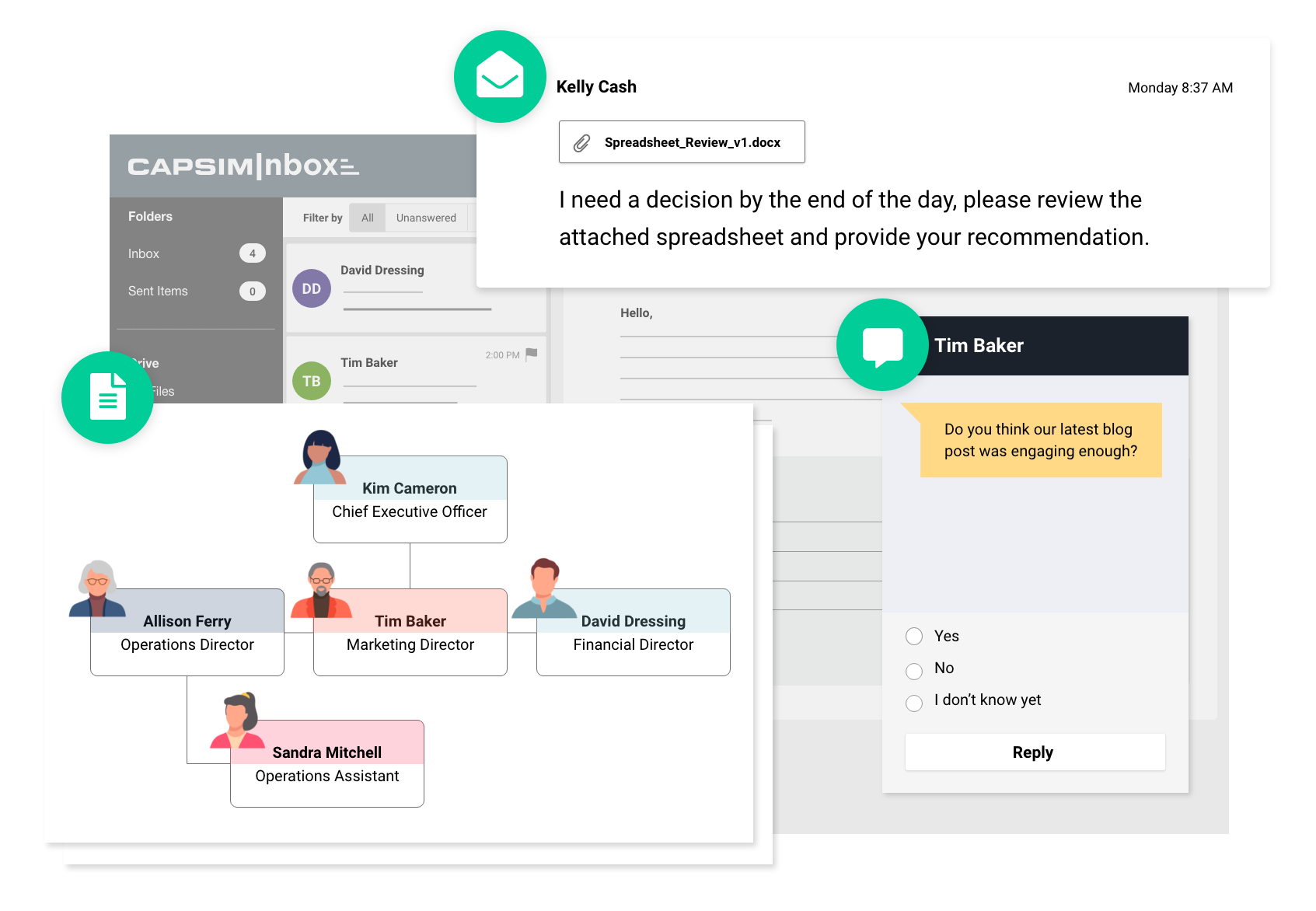5 Leadership Soft Skills Your Managers & Executives Need for Success
January 12, 2022

A 2019 report from DDI’s Frontline Leader Project showed that fifty-seven percent of employees who quit report their manager as their chief reason for quitting. This means the soft skills of your leadership are a driving force for retaining your employees.
Additionally, senior leadership sets the tone for how their team and the organization as a whole operate. If they are missing key soft skills, they may not be steering your organization in the right direction.
Your management and senior leadership team can have all the hard skills and credentials they need to help drive your company forward, but if they don’t have the soft skills to match, your business may end up hemorrhaging talented employees and developing a toxic or counter-productive company culture. This begs the question: what leadership soft skills should you be developing with your middle managers, VPs, and executives?
Below, we’ll examine five of the top soft skills every good leader should have. We’ll discuss what each soft skill is, why it’s important for leaders, and explore how to develop these soft skills in the workplace.
The 5 Soft Skills Your Leadership Team Needs
In the spring of 2021, we saw the start of a workplace phenomenon some experts call “The Great Resignation.” Employees began leaving their jobs in droves, leaving many companies understaffed.
In the face of this seismic shift in employment, employers need to be more cognizant than ever of their employees’ satisfaction with leadership. If you’re going to combat the effects of the Great Resignation and hang onto your employees, you will need to ensure that your management has the soft skills necessary to keep your workers from running for the hills.
But employee retention isn’t the only significant shift in the present climate. Recent world events have also resulted in massive shifts concerning the use of different technologies in the workforce. Forbes.com estimates that by 2025, 70 percent of the workforce will be at least partially remote.
Remote work may not be on the immediate horizon for your organization, but technology is always advancing, creating opportunities and causing changes in daily operations. If your leadership doesn’t have the soft skills in place to adapt, adopt, and encourage employees to do the same, your organization will struggle to keep up with the times.
Read on to learn more about those five skills, and what makes them so vital to your company’s success.
RELATED READING: Using Simulations for Soft Skill Development in 2021 and Beyond
Communication
What It Means
Communication skills refer to all the ways your leadership interacts with others. This includes interactions with employees, customers, and other leaders at your organization.
When we think about communication skills, often we think about a person’s public speaking abilities or customer service skills, but communication encompasses much more than that. A leader who is skilled in communication is able to collaborate with others, set expectations, and listen to the thoughts and contributions of others in the organization.
Why Leaders Need It
Leaders need to be skilled communicators because human interaction is the cornerstone of leadership. A capable leader must be able to effectively express their thoughts and ideas for the direction of your organization, set clear expectations for their employees, and listen to insights from others. These are all communication skills.
Additionally, when employees feel heard and respected by leadership, they are less likely to leave your organization. Sixty-six percent of employees will quit if they feel unappreciated at work. A leader who is skilled in communication can listen to the needs of their employees and express appreciation for the work they do, increasing the likelihood that good employees will stick around.
Problem-Solving
What It Means
Problem-solving refers to your leaders’ ability to analyze a problem, devise and evaluate possible solutions, and implement the best option to solve the problem.
This skill incorporates both a leader’s ability to look at a problem creatively and their tendency to see the solution through to the end. Problem-solving also requires a leader to think proactively and solve problems before they become troublesome for the organization.
Why Leaders Need It
A leader’s job is to guide their team — and ultimately, your organization — toward success. Problems will inevitably arise on that journey, and managers should lead the charge to solve them when they do.
As a leader, your problem-solving skills should go beyond just putting out fires as they ignite. An effective leader is able to assess the situation surrounding the problem to discover the root cause, then take steps to resolve the problem at its source instead of just treating the symptoms.
For example, if customers are consistently calling to complain about the same issue, instructing and encouraging your team to soothe each customer and keep them happy isn’t enough. An effective leader will also take steps to find the source of that issue and implement a creative solution, preventing future calls.
Decision-Making
What It Means
Decision-making skills refer to a person’s ability to choose between two or more options. When discussing decision-making in business situations, the choice must often be made under pressure.
However, there is more to decision-making than simply being bold enough to pull the trigger on a choice. Strong decision-makers can assess a situation, gather appropriate information, and identify the processes that will enable them to make the right decision. Part of decision-making is identifying the risks and rewards associated with each decision and anticipating the outcome for each choice.
Why Leaders Need It
While leaders skilled in communication will seek advice and input from others, they are in charge of decision-making for the segment of the organization they oversee. It follows that an indecisive leader can cause confusion or stagnation in the organization, as without their guidance, the rest of the team can’t choose a path to move forward. Decisive leaders reduce uncertainty and anxiety in their staff.
Additionally, a leader who makes measured, thoughtful decisions can increase employee trust and retention. Employees feel more valued when their leaders take time to make decisions that benefit everyone and explain the rationale behind those decisions to affected staff.
Conflict Resolution
What It Means
A person skilled in conflict resolution is able to find common ground between two or more parties in a dispute. There are many elements to this soft skill, including empathy, emotional regulation, and stress management.
To be skilled in conflict resolution, you need to be able to examine a conflict in a critical, unbiased way to determine the underlying issue. You then must be able to clarify the issue for all involved parties, listen to their proposed solutions, and guide everyone to a resolution all parties can agree on.
Why Leaders Need It
Company culture is essential to the success of your organization and the retention of your employees. A company culture steeped in unresolved conflict will inevitably become toxic over time.
As a leader, it is your job to resolve conflicts between employees healthily and productively. You will also need to ensure that you are unbiased in your conflict resolution efforts.
To examine whether or not your conflict resolutions are unbiased, you may want to consider this question: If an outsider were to poll your employees to ask them who your favorite employees are, would there be a clear consensus in those answers? If so, you may need to examine the biases you have toward your employees.
Additionally, a strong leader should be able to address conflicts between employees and themselves in a similar manner, creating a positive work environment where employees feel heard, valued, and empowered to speak up when they have a concern.
Motivation
What It Means
Motivation as a soft skill is two-fold. Firstly, motivation refers to self-motivation. Do you take initiative to complete tasks without being asked or supervised?
The second side of motivation is your ability to motivate others. Can you encourage your employees in a way that brings about positive organizational results? This type of motivation requires the capability to perceive your employees’ struggles and goals, and your ability to solve those struggles and tie personal goals to the goals of the organization as a whole.
Why Leaders Need It
The reason leaders need self-motivation is fairly evident. As the leader, it’s unlikely that you will have someone standing over you observing your daily performance. Every leader needs to be a self-starter.
Leaders need to be able to motivate their employees because the dedication of your workforce determines how the organization as a whole moves forward.
As a leader, the effective distribution of work is an essential part of the job. Getting to know your employees’ strengths, weaknesses, and personal goals can assist you in delegating the right tasks to the right workers. Workers who are more intrinsically motivated to complete a task will produce better output, driving the organization forward.
Motivated workers are also less likely to leave the organization, meaning that a leader capable of motivating their employees is a valuable asset to employee retention efforts.
Develop Leadership Soft Skills with CapsimInbox
When you look at your senior leadership team, do you see any skill gaps when it comes to these five essential soft skills? If so, you may be at risk of losing talented employees working underneath those leaders.
What’s worse, without these skills, your business’s leadership cannot set your organization up to prevail over the competition, and weather periods of change or innovation as they arise. The good news is that, like all skills, soft skills are teachable.
CapsimInbox offers authentic, validated simulations that give managers and executives the chance to react to real-world situations in a controlled environment. The results of these simulations can identify areas of improvement, allowing leaders to self-assess and continue training the skills in which they need the most work.
Get started with a free self-guided demo today to start assessing and strengthening the soft skills you and your leadership team need to succeed.





.png?width=80&name=1-questions%20(1).png)